Introduction
The right career choice for the students entering into the professional education is critical having high impact on their professional life and future achievement. This is the turning point: it cannot be left, on intuition, preconceived notions, wild imaginations or popular concepts. A miss-perceived career choice directs all individual efforts and resources into wrong direction, when not aligned with the expectations; would not only be frustrating rather draining of the individual energy and wastage of resources. The re-alignment is possible, but it has serious implications in terms of time, money and motivation. The career choice of the students must need to be based on; strong knowledge, complete information, and appropriately guided, matching individual personality type and other intrinsic and extrinsic factors. The students need to be oriented on new emerging trends, future opportunities and challenges in the context of career choice options. They need to know the prevalent market trends and practices and job scenario of various sectors.
This study is focused on students enrolled in business discipline; the courses which are offered to business students are MBA, BBA, and BS etc. The business students are those who obtained a university degree in Business Administration. They obtained degree in Business Administration with major courses in marketing, banking and finance, human resource management, management information system, supply chain management, and some students do bi-majors that are specialized in two fields simultaneously. However their career choice for selection of the particular specialization needs to be based on complete information and market place practices. The institutes regularly hold sessions with the corporate professionals, companies and trade bodies to create interface with the students. The interface with the industry professional is extremely important, it provides the students with the opportunity to discuss and clarify their thought process and align their perception about various disciplines and career options with the actual ground realities. The universities have the student counseling department where the career guidelines are provided to the students to help them understand the various disciplines and select the one that matches their aspirations, interest and personality type. The success of the young leaders in their career endeavors depends on the alignment of their career choice with their interest and personal preferences.
Choice of career is standout amongst the most noteworthy determinations for business students that will be supportive to them in their future thoughts. The significance of picking a specialization in Administration and any courses accessible is a key and essential part for each business student as it will be the building pieces of achievement later on. One must be more learned about the way they will be taking for this choice. Numerous variables influence career decisions of secondary school students. Recognizing these variables would give individuals, instructors, and industry a thought as to where to put their trust in the profession choice procedure which incorporates organization, financial firms or enterprise, human asset administration, data framework, hierarchical conduct, advertising, research routines, and so on. The components that impact while selecting business institute incorporates area, picture, workforce, research opportunities, industry linkages, and promoting, expense structure, and so forth. These business students subsequent to getting degree begin their careers in real business world. Also there would be business students who therefore choose what the right way is for them inside of the time compass of the first year and afterward there are the slow learners who take very late choices. The orientation of this choice will affect the business students’ life for no more less than 30 years.
Scope of the Study
The scope of the research study is focused on the students enrolled in business institutes and universities in business administration and studying various courses in their BBA /MBA program. They yet have to pass through the process of making their career choices by selecting the specialized area within business discipline. This study would have a more prominent position for the master students to get themselves prepared and to sorts out other than occupation, the linkage with the experts involved in business firms arranging and planning endeavors for the fresh business graduates to help them in correct career choice.
Objectives and Significance of Study
The objective of this research study is to investigate the factors that influence the career choice decision of the business discipline students. The study results would be helpful for the student counselors, parents, and universities, in developing the career counseling and guidance programs for the students to facilitate them in making the right career choice. The study was focused on the following key areas:
- To determine the influences on the decision making process of management science students in their career selection.
- To derive the relative weight of each factor and see which factor is more influential?
- To divert the attentions of academic researchers and influential people towards how the human capital of our country makes their career selection decision.
Statement of Problem
Career selection decision making process is one of the key elements in an individual’s life (Alberts et al. 2003). There exist numerous problems encountered by students in their process of career selection (Olamide and Olawaiye, 2013). Wrong career selection opens the door for life-long consequences (Mashige and Oduntan, 2011).Such individual’s by underperforming becomes a source of inefficiency not only for themselves, their organization but also for the economy as a whole. (Issa and Nwalo, 2008).
Pakistan is a developing country with minimum GDP growth rate of 4.71% (economic survey of Pakistan, 2016) and HDI ranking of 147 out of 188 countries worldwide (UNDP, 2014-15) If the core educated population of the country enrolled in business schools would not be taking right career decisions, then the country would not be able to boost up itself in order to compete in such complex and dynamic environment.
Literature Review
Review of the literature will be explored within this chapter that evaluate and contrast research in factors that influence career choice decisions and the extrinsic and intrinsic factors will be discussed in detail with the help of current research studies. Specifically, the literature will reveal what factors are important in making career choices by the management sciences students and which factors are impactful in different contexts and cultures in the world. These factors eventually all guide to the awareness that career choice is not a lineal process but that it has factors that are influential in terms of making future plans and those factors themselves are influenced by the surroundings, external environment, country situation, family orientation and personal interests.
The word career has been a derivative of French and Latin origin. Its simplest definition is given by Geciki (2002) as; the occupational, commercial or industrial activity that a person may adopt during his educational life or in some other part or till his death. Redman and Wilkinson (2001) clarifies career as the application of a person’s cognition and capabilities, providing command over profession, timely work expertise and a basis of developing and bettering business networks. Individuals chose career planning to pursue the professional objectives, getting informed about upcoming opportunities, their results and their timely evaluations. It is considered to be a beginning in the stages of career choices but still of paramount significance. People prefer the career that could provide them sound basis for an improved standard of living (Cavus, Geri and Turgunbayeva; 2015). Career planning done on individual basis is a plan as to how an individual would foster in his profession. As regards the organizational level, it talks about promotional aspects together with personal development quadrant. So briefly career planning is the process whereby the individual himself or his organization helps in pursuing his growth objectives in conformity with his expertise in the area, capabilities and aims (Bayraktaroğlu, 2011).
Choices that people make related to their career can be categorized to be influenced by two factors that are psychological and social. Social factors are part of an individual’s social bonds, their parents, family, history and other characteristics of their environment. Psychological factors can be an individual’s perception, cognitive and effective intentions, beliefs, ideas, personality and assessments related to forthcoming business environment (Ozen, 2011). Different inquiries on the life of the students have come up with different findings. The results of a quantitative study conducted in central Pennsylvania by taking rural young adults and adolescents as respondents indicated that influence exerted by an individual’s family, society, state of economy, their interpretation of better job and financial constraints were major reasons that can impact their career selection (Ferry; 2006). A systematic review of 600 articles published in 2003-2013 of low-income countries conducted by Puerto’s EB (2013) determined intrinsic factors amongst medical students (age, sex, rural background) and extrinsic factors (salaries, governmental institutions, medical institutes reputation, training techniques) influence a medical student’s decision to choose a career in primary care; and to establish that some factors were different among students in high-, middle- and low-income countries.
Interest in the subject
Studies conducted in different countries different cultures can sum up with different relationships among variables selected for the study; for example, in Kenya personality types and interest in subject is a factor that impacts lot on making career choices by the students, but if we look at this similar kind of study conducted in South Africa where demographics and culture are totally different it, revealed that the financial factors impact on career choices of students, Fatima Abrahams et al (2015). Zing (2007) research concluded that personal liking of an individual towards a particular subject contributes in his career selection decision. Shertzer and Stone (2003) found that interest depicted by students in some subjects will mostly lead to the better examination performance and selection of profession in the same direction. Alexander et al (2011) examination of students enrolled in the disciplines of information technology found that liking of the subject has chief significance when looking at the factors contributing in professional direction adopted by students. Edward and Quinter (2012) investigation disclosed that an individual’s proclivity towards a particular field or subject, its predilection for a particular job and match between his personality and selected professions is an important factor contributing in career path.
It is apparent that a relationship exists between personality and career interest in a particular subject. There is also personality differences in career choices amongst students, stated by the study conducted on students of Institution of Technology (IOT) in Ireland. Statistics showed that there is three times higher ratio of dropouts of adolescents from the course/subjects than from university, Higher Education Authority (HEA) evidenced that this is because of wrong initial career choices. Clement H (2014) investigated one of the major factors is the mismatch of personality with a course/career. In the process of making career choices, personality plays a significant role; productivity, fulfillment and motivation are directly related to the individual. Lack of fit can be the most dangerous cause of dissatisfaction and ends up in to the stress career failure. Rebecca J. et al (2016) conducted a study on 399 students in Kenya which resulted in that there is a relationship between personality types, and career choice. Most of the students were satisfied with the course they selected before entering the university which indicates that suitable career choice for students would improve satisfaction and success in their course of study and future employment. But on the other side, when students make changes in their course section it indicated that the choices of subject selection did not go in line with their future career choices. Consequently, it constructs probability of the status of the relationship between personality types and career choice among undergraduate students in Kenya. The study revealed that there is a significant relationship between personality types and career choices among undergraduate students. Christine (2005) study conducted in South Africa on 770 students to determine the relationship between the personality traits and career choices, and because of cultural and environmental change the relationship seems weaker as compared to other countries. 770 respondents completed the Sixteen Personality Factor Questionnaire (16PF) and the Interest Questionnaire (INQ). Partial correlations showed that gender and race may influence these relationships, however these were slight changes.
Future Job Opportunities
Career growth, is an ongoing process for some people;they get engaged in different jobs through choosing amongst job opportunities available in the market. Every person undertaking the procedure of choosing opportunities subjective by many factors, context they live in, personal aptitudes, and educational skills (Bandura, Barbaranelli, Caprara, & Pastorelli, 2001). It is natural that people always try to forecast or direct sometimes the future which is uncertain, so as students, always try to plan their careers for a secure future where superior job opportunities are the important factor that might prejudice the career choices. A career plan would help students to feel contented in their job, which will directly leads to satisfaction. Preliminary career choice is an intellectual, developmental job that youngsters are projected to have accomplished by the end of their high school year (Super, Savicks, & Super, 1996). Wide range of difference was found when mature students were surveyed, as they were not influenced by the culture but by securing their future. It is also found that in middle class schools career choice counseling was not that important but in affluent schools counseling of making career choices was a norm.
Azizzadeh et al (2003) studies based on medical science students found that career opportunities in combination with prestige are the most important factor in the decision making process of surgical career selection. Often, it is thought that family and community as a sheer start to workplace willingness; though, this decision plays a key role in launching students on a career path that opens and closes opportunities. Bluestein, Phillips, Jobin-Davis, Finkelberg, & Roarke, 1997 stated in a study that career choices with the influence of future job opportunities are also different in management sciences students and adolescents in the school. Again a research study of Muranguri (2011), confirms the presence of several agents, mixing up to give the resultant of profession selection. According to him, an individual’s own trait, his cultural environment, his family experiences, guidance and expectation provided and pertinent to particular field has an effect on the occupation selected by an individual.
Financial Outcomes
Study conducted on 721 undergraduate students established the role of major sources of financial support for the students; parents and bursaries were found as significant among these. results also revealed that forecasted future benefits from the career including chances for higher future earnings and promotions were factors that influence career choice amongst undergraduate students in South Africa, besides that visits from professors (for career counseling) is also an influential factors in making career choice. Another construct or item that is widely discussed in researches is financial constraints faced by individuals, hampering their decision making process of career selection. Kerka (2000) claims that piece of information utilized by individuals and financial resources at their disposal significantly interfere in individuals’ decision making process of career selection. Ushure (2014) lectures indicated that limited finances available to students will affect them negatively in their preferences of profession selection. Their desires to become specialist in renowned fields like engineering, doctorate etc. would be restricted by the availability of finances to them. He also argued that in some cases even the children who belong to low status families’ ends up entering in high status professions despite their high cost. This is because their parents want them to enjoy those aspects of life that they have missed out due to their insufficient wealth. Bochert (2002), PhD thesis is based on the same topic in which he found that opportunities opened to an individual can contribute significantly in one’s choice of desirable career. Poverty and income constraints hinder their way of career success so these opportunities in various forms help them in shaping their career path.
Ease of subject
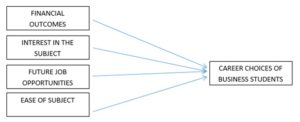
Figure 1: source: Factor influencing career choices
Theoretical Framework describes both dependent and independent variables. At the center of the model there exist the dependent variable (choice of career among business students) and the independent variables all around it. Any of these independent variables may affect career choice. These variables and their relations are found from the analysis of the hypothesis developed by this model.
Hypothesis
H1: There is no relationship between Financial Outcomes and choice of career of business students.
H2: There is no relationship between Ease of Subject and choice of career of business students.
H3: There is no relationship between Future Job Opportunities and choice of career of business students.
H4: There is no relationship between Interest in subject and choice of career of business students.
Research Methodology
This is a quantitative research; we have selected questionnaire approach in order to collect primary data from business students. The questions were closed ended. This method will help the researcher to analyze the problem deeply. Business students are the target population for this research. The business students of different business schools of Karachi are selected to answer the questionnaire. Convenient sampling method is used and 145 questionnaires were distributed out of which only 120 were found to be having complete data that can be used for analysis. Response rate was high as 82.75% and only 17.25% of questionnaires were not included in the analysis. Questionnaires consisted of single A4 size page, contained five sections assessing Interest in subject, Ease of subject, financial outcomes, Future job opportunities and career choices. 20% respondents belong to 19-23 groups, 50% belong to 24-27 group, and 30% belong to 28 and above group. The majority were male’s 69% and 31% females. As far as the area of specialization in MBA/BBA is concerned, 22.5% respondents belonged to Marketing; 30% to Banking & Finance, 23.33% to HRM, 4.16% to MIS, 14.16% to Supply and Chain and 5.83% to others.
Data Analysis
The results of Reliability Analysis are discussed below.
Table 1: reliability analysis
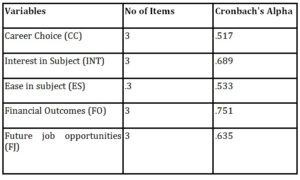
The alpha coefficient for the three items of each variables mentioned are as (CC = .517, INT = .689, ES = .533, FO = .751 & FJ = .635). According to standards,the reliability coefficient of .60 or higher is considered “acceptable” in most social science research situations and in this research statistics shows three variables that are independent are acceptable (INT, FO & FJ) and two variables (CC [dependent] & GR independent) are coming close to 0.6.
Statistical Methods
Subsequent suitable statistical tools were used for data investigation.
- Pearson correlation
Allowing to the necessities of the theoretic model, the test of determining the link between variables is Pearson correlation, as it checks the “interdependency” of the variables deliberated in the model.
- 2. Multiple Regression analysis
To measure the strong point of I.V‟ on D.V and consequence of the model, the multiple regressions are castoff as there are further than one independent variable present in the model and only one dependent variable
Table 2: Correlations
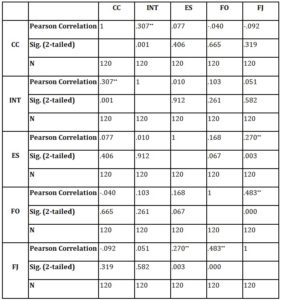
**. Correlation is significant at the 0.01 level (2-tailed)
The correlations table indicated that there exists a high positive association between career choices and interest in the subject (r= .307, n=120, p= .001) and there exists no statistically significant linkage between career choices and ease of subject (r= .077, n=120, p=.406.), financial outcomes (r= .04, n=120, p= .665), and future job opportunities (r= 092, n=120, p= .319). Interest in the subject is statistically significantly associated with none of the independent variables. Ease of subject is statistically significantly associated with future job opportunities (r= .270, n=120, p= .003).Financial outcomes are significantly linked with future job opportunities (r= .483, n=120, p= .000)
Table 3: Model summary
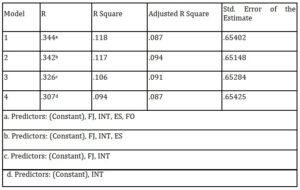
Model summary table indicates suitability of the regression model to the specified data. Backward regression results indicated fourth model to be the most significant one. Fourth model takes in-to account only one independent and one dependent variable. R square value is .094 this means interest in the subject can bring variation in career choices up to 9.4%. . Values of R signal simple correlation that is .307.
Table 4:_ Anova statistics
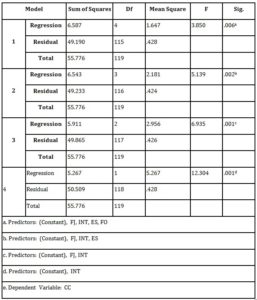
Focusing on the last model and interpreting the table, it can be found that interest in the subject can statistically significantly impact the career choices made by business students F (1,117) =12.304, p<0.
Table 5: Coefficients statistics
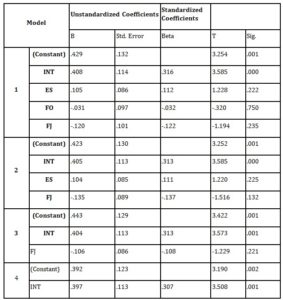
With the help of coefficients table, we can conclude the regression equation for the last model and the rationale for rejecting or accepting each null hypothesis:
Hypothesis number 1:
Backward Regression results taking ease of subject, interest in the subject, financial outcomes and future job opportunities as independent variables and career choices as an dependent variable found that despite the overall significance of- model 1, the three variables in the model are having insignificant values that are ease of the subject (t=1.228, p>0.05), financial outcomes (t=-.320, p> 0.05), future job opportunities (t=-1.194, p>0.05). It excludes the most insignificant of the four independent variables that is finance outcomes (p=.750) in order to improve the model. This makes us accept our first null hypothesis that is, H1: There is no linkage between Financial Outcomes and choice of career.
Hypothesis no 2:
In the second model, we are again left out with three independent variables but the two are again found to be in-significant and the most insignificant of these three that is ease of subject (t=1.220, p=.225) will be excluded. This would again make us accept our second hypothesis that is, H2: There is no linkage between Ease of Subject and choice of career.
Hypothesis number 3:
Despite the exclusion of two variables, the model still needs to be reconsidered since again an independent variable that is future job opportunities is found to be insignificant (t=-1.229 , p=.221). The backward regression test will again exclude this variable in order to improve the model. This will make us accept our third hypothesis that is; there is no linkage between future job opportunities and career outcomes.
Hypothesis no 4:
The last model in the coefficient table incorporating only interest in subject (p=.001) and career choices is found to be the most significant one. Thus our last hypothesis will be accepted that is, H4: there does not exist a statistically important linkage between interest in the subject and career selection.
Regression equation taking interest in the subject as independent variable and career choices as dependent variable is as follows:
CC=.392+ .397INT
Discussion
The study of earlier research on the career choice of students has highlighted the importance of the career choice decisions and their long term implications on the career of the students. Statistics showed that there is three times higher ratio of dropouts of adolescents from the course/subjects than from university, Higher Education Authority (HEA) evidenced that this is because of wrong initial career choices. Clement H (2014) investigated one of the major factors is the mismatch of personality with a course/career. Lack of fit can be the most dangerous cause of dissatisfaction and end up in to the stress career failure. The empirical studies also revealed that the career choice of the students is influenced by several factors that may vary from country to country due to unique socio-economic, geopolitical and demographic factors. The study was conducted to test the linkage of career choice with interest in the subject, financial outcome, ease of subject and future job opportunities and job outcome; the earlier research studies have shown a positive association between financial outcome and career choice. Another construct or item that is widely discussed in research is financial constraints faced by individuals, hampering their decision making process of career selection. Kerka (2000) claims that the piece of information utilized by individuals and financial resources at their disposal significantly interferes in individual’s decision making process of career selection. Ushure (2014) lectures indicated that limited finances available to students will affect them negatively in their preferences of profession selection. However, this study’s results revealed weak or insignificant association between the career choice and the financial outcome in the business students of universities in Karachi that could be due to the reason that the respondents participated in the study mainly belonged to private business institutes where the population relatively belong to middle or upper middle class; while the students studying in government universities, who belong to lower middle or lower-lower income group students, are constrained by financial resources and their counselors and parents do consider the financial outcome of the job while advising them on career choice decisions.
The other factors influencing career choice investigated in this study was future job opportunities and job outcome were found to have weak or insignificant relationship with career choice decisions of the students contrary to the earlier research studies that have shown some linkage between future job opportunities and career choice. It is natural that people always try to forecast or direct sometimes the future which is uncertain, so as students; always try to plan their careers for a secure future where superior job opportunities are the important factor that might prejudice the career choices. A career plan would help students to feel contented in their jobs, which will directly leads to satisfaction.
The factor investigated for its association with the career choice decisions was “ease of subject” that was found to have insignificant relation with the career choice decision in this study. The earlier research studies also did not provide sufficient evidence to establish the relationship of ease of subject with the career choice decision. However a vast majority of candidates enrolled for university majors found themselves lacking intellectual abilities required for certain elective courses. They wanted to ease their lives by avoiding enrollments in such majors or specialized courses. They do not want to involve in the fields that may sound to require extensive hard work (Fizer 2013).
The fourth and the foremost important factor investigated in the study was the influence of “Interest in Subject on Career Choice”. The empirical studies conducted have determined a positive and significant relationship between interest in the subject and the career choice decision of the student. Research papers based on respondents from the university of Makere Uganda also depicted that students adopting the agriculture career are mainly interested in this field. About 30.3% respondents agreed on that interest along with their past experience in field lead them to adopt career in agriculture (James and Denis 2015). L.T Wurn et al (2015) literature review on this topic also signaled the same result. Within their review of literature, nurses, pharmacists, doctors and dentists were the basis of attention. The data taken for review comprised of approximately 21 research papers which were published from 2002-2013 in different data bases. The results indicate that health care professionals chosed their career because of personal liking and also to benefit people by their services. The study results also revealed that interest in the subject has some link with the personality type; people have interest in the subject that matches their personality type. Rebecca J. et al (2016) conducted a study on 399 students in Kenya which resulted in that there is a relationship between personality types, and career choice. Most of the students were satisfied with the course they selected before entering the university which indicates that suitable career choice for students would improve satisfaction and success in their course of study and future employment.
Conclusion
The paper attempted to see the fundamental variable that impacts the choice of career of the business students in relationship with different factors. The study derives that interest in subject has strong and positive relationship while; ease in grades, financial outcomes, and future job opportunities are less related or have minor impact on students’ decision for particular field and subject. Interest in the subject is also related and has some linkage with personality type. Mismatch of the personality and lack of interest in the subject is dangerous, and could end up into disastrous results in terms of student dissatisfaction, demotivation, lack of productivity leading to increased drop outs and career failure. On the contrary, the students’ performance could excel and deliver better results if the area of study is matching and aligned with the intrinsic factors of the individual’s personality, leading to internal satisfaction, motivation and commitment. The previous research revealed that the career choice variables of the students have some association with the financial outcome of the course and future job opportunities, however these variable vary with the socio economic and demographic factors. The career choice of the students is also influenced by the level of their social status, financial resources, affordability and future employability.
Limitations
This study was surveyed with the help of different business institutes; although the students respond well to the questionnaire but still we had 120 responses out of 147 questionnaires floated. The present study is limited in scope of time span and sample size. Particularly, the study focuses only on business students in local universities. Thus, the findings of the study have limited Generalizability.
Recommendations
The above literature analysis and study need further research, the results of which will help us to better comprehend the decision criteria and procedure for students. As the interest in the subject is found as the dominant factor, which is area of specialization and for this, support is needed from professional instructors and institutes to orient the students on the latest emerging trends, new areas of interest and its impact, to direct the students’ interest in the right direction and make multiple interest areas available to them for making better career choices. It is also important to consider the personality type and intrinsic factors of the student while advising them on their career choice preferences because their future performance and success is directly impacted by these factors, and mismatch of the career choice with the personality could be disastrous. In view of the importance of the topic and its implications on the future success of the students in their career, it is strongly recommended to make further studies to investigate the factors influencing the career choice of the students; and use the findings in the student counseling and support centers to orient the students about their career choice criteria and options. These research prospects might helpfully be grouped as follows: find new recommendations/implications from prevailing studies; and, incorporate models from other corrections, such as study program features; vary the procedure and time-frame required for particular subject studies.
(adsbygoogle = window.adsbygoogle || []).push({});
References
- Alberts, C., Mbalo, N. L. & Ackermann, C. J. (2003). ‘Adolescents’ Perceptions of the Relevance of Domains of Identity Formation: A South African Cross-Cultural Study’. Journal of Youth and Adolescence, 32 (3), 169-184.
- A, McCollum CH ,Miller CC 3rd,Holliday KM,Shilstone HC, Lucci A Jr,’Factors influencing career choice among medical students interested in surgery’.Curr Surg.2003 Mar-Apr;60(2):210-3
- Alexander, P.M., Holmner, M., Lotriet, H.H. et al. J Sci Educ Technol (2011) 20: 300. doi:10.1007/s10956-010-9254-3
- Bayraktaroğlu, S. (2011). İnsan Kaynakları Yönetimi. 4. Baskı. Sakarya: SakaryaYayıncılık
- Beggs, J.M, J.H. Bantham,and S. Taylor. 2008. ‘Distinguishing the factors influencing college students’ choice of major. College Student Journal. 42(2): 38
- Borchert (2002), ‘career choice factors of high school students’, A Research Paper, Submitted in Partial Fulfillment of the Requirements for the Master of Science Degree with a Major in Career and Technical Education. The Graduate College University of Wisconsin-Stout
- Cavus, Geri and Turgunbayeva; 2015 ‘Factors Affecting the Career Plans of University Students after Graduation’, International Journal of Humanities and Social Science. 5, No. 5.
- Edwards, K., & Quinter, M. (2012).’ Factors Influencing Students Career Choices among Secondary School students in Kisumu Municipality, Kenya’. Journal of Emerging Trends in Educational Research and Policy Studies, 2 (2): 81-87
- Economic survey of Pakistan, 2016, www.Finance.org.pk / survey / chapter16 / 01 _ growth _ investment.pdf.
- Ferry; 2006, ‘Factors Influencing Career Choices of Adolescents and Young Adults in Rural Pennsylvania’, June 2006, Volume 44, Number 3. Research in Brief, 3RIB7.
- Fizer (2013), ‘Factors Affecting Career Choices of College Students Enrolled in Agriculture’, A Research Paper Presented for the Master of Science in Agriculture and Natural Resources Degree, The University of Tennessee, Martin
- Geçikli, F. (2002). Bireysel Kariyer Planlama ve Geliştirmede İmajın Rolü. İstanbul Üniversitesi İletişim Fakültesi Dergisi, (15), 337-354
- Hewitt, J. (2010). ‘Factors influencing Career choice’. Retrieved on 15/02/2010 from www.ehow.com
- James and Denis (2015) , ‘Factors influencing career choice among undergraduate Students in an African university context: The Case of Agriculture Students at Makerere University, Uganda’ ,journal of Dynamics in Agricultural Research 2(2), pp.12-20, May 2015 Article ID: JDAR15/015
- Issa, A.O., & Nwalo, K.I (2008).’ Factors affecting the career choice of undergraduates in Nigerian Library and information science Schools’. African Journal of Library, Archives and Information Science, 18 (1): 23-32
- Kerka, S. (2000). ‘Career choice, gender, race and class’. Eric cleaning house on adult career and vocational education Columbus. ED 421641.
- T Wu RN, BSN, M.M.J. Low, RN, BSN(Honors). K.k. Tan ,RN, BSN, Med,V. LopezRN, MNA, PhD, and S.Y. Liaw, RN, BHSN,MHS(ed), PhD, Y not nursing? ‘A systematic review of factors influencing career choices among health care students’. International nursing review 62,547-562.
- Mashige, K.P., & Oduntan, O.A., (2011). ‘Factors influencing South African optometry students in choosing their career and institution of Learning’. The South African Optometrist, 70(1) 21-28
- Muraguri John Mwangi (2011). ‘Factors influencing degree choices among female undergraduate students at the University of Nairobi – a case study of the 2010/2011 cohort’, unpublished MA research project, University of NairobI
- Olamide, S.O., & Olawaiye, S.O. (2013). ‘The factors determining the choice of career among secondary school students’. The International Journal of Engineering and Science, 2(6):33-44
- Özen, Y. (2011). Kişisel Sorumluluk Bağlamında Kariyer Seçimini Etkileyen Sosyal Psikolojik Faktörler. Eğitim ve İnsani Bilimler Dergisi, 2(3), 81-96.
- Redman, T.&Wilkinson, A. (2001).Contemporary Human Resources Management, NewYork: Financial Times Prentice Hall.
- Tanuja Agarwala, (2008) “Factors influencing career choice of management students in India”, Career Development International, Vol. 13 Iss: 4, pp.362 – 375
- UNDP: 2014-15, http://hdr.undp.org/sites/all/themes/hdr_theme/country-notes/PAK.pdf
- USHURHE, 2014 – 11th lecture series: ‘developing a successful career among secondary school teachers in Nigeria: a genetic or environmental factor’
- Waudo, R. (2008). ‘Challenges That Face Women in Managerial Positions in the Print Media in Kenya’, UON: Unpublished MBA project
- Zhang, W. (2007). Why IS: ‘Understanding undergraduate students’ intentions to choose an Information Systems major’. Journsl of Information Systems Education, 18(4), 447-








